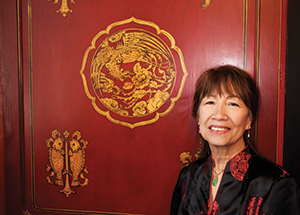Chinese Nationality Room: Teaching by Inspiring
A gold-leaf imperial dragon coils in the ceiling of Pitt’s Chinese Nationality Room, engaging visitors with its shimmering detail. Beneath it sits a round lacquered seminar table, where professors and students participate together in learning. Carved on the professor’s chair at the table is the Confucian admonition, “Teach by inspiring, gradually and steadily.”

Confucius could have used similar words about the development of the Chinese Nationality Room itself. From its tentative beginnings in 1920—to this year’s celebration of its 75th anniversary—the room came into existence very gradually and, in fact, almost never came to fruition at all, said E. Maxine Bruhns, director of Pitt’s Nationality Rooms and Intercultural Exchange Programs.
A group of Pitt students from China petitioned the Chinese government in 1920 for a donation to begin fundraising for the room’s development. The Chinese government pledged $5,000 in gold, but the eruption of The Chinese Civil War in China in 1927 put that donation on hold. Not to be dissuaded, the committee of students and Pittsburgh business owners canvassed neighborhoods of Chinese residents up and down the East Coast to solicit donations, eventually raising the initial $5,000 deposit.
Following 15 years of fundraising, the Chinese government in 1935 forwarded its contribution to Pittsburgh, and the room was dedicated four years later. It cost the equivalent of about $250,000 in today’s dollars, and is one of 29 Nationality and Heritage Rooms housed in the Cathedral of Learning. Each represents a different nation or heritage, all of which played a part in the historical development of this region.
Instrumental in raising early funds and support for the Chinese Room was Hoy Fung, the father of Karen Yee, a Pitt alumnus who has chaired the Chinese Nationality Room Committee since 1988. But Fung never laid eyes on the room until he retired in the 1970s. Owner of the iconic Bellevue Tea Garden in the northern suburb of the same name, he worked six days a week, leaving just Sundays to spend with family. There was no time to visit Oakland.
“The room meant so much to him, and he spent decades making sure the money was there to keep it going,” said Yee (A&S ’70), of Bethel Park. “He was very proud of the room when he finally saw it, but he knew all those years that people were enjoying it and learning from it. That’s what mattered.”
Fung’s cousin, Kwok Ying Fung, did the original calligraphy work in the room.
The room’s committee and supporters marked its 75th anniversary on Oct. 6 with a dinner and program at the Sheraton Station Square, Downtown. According to Yee, Chinese and global economics, politics, wars, and other world events over the past 75 years have had little effect on the Chinese Room. Donors and supporters have remained steadfast in their efforts, she says.
The Chinese Room was inspired by a palace hall in Beijing’s Forbidden City and is dedicated to the memory of Confucius and his democratic ideal of classless education.
Yee said the room was lavishly decorated in traditional holiday style for the Dec. 7 holiday open house, and will remain decorated through February in celebration of the Chinese New Year, the Year of the Ram in 2015.
Each Nationality and Heritage Room has its own committee, which oversees fundraising and development as well as providing annual student scholarships to study overseas. The Chinese Room Committee has sent 48 undergraduate and graduate students to study abroad in China, Taiwan, or Hong Kong since 1982, Bruhns said.
Yee said her mission has always been to recognize and honor the sacrifices of those who established the room and to share the rich traditions of the Chinese culture.
“There is no other program in the world that offers classrooms for students to learn and honor ethnicities,” Yee said. “It is so unique and wonderful. My dad always told us that if we were lucky enough to do well in life and provide for our family, we had a duty to give back.”
Other Stories From This Issue
On the Freedom Road

Follow a group of Pitt students on the Returning to the Roots of Civil Rights bus tour, a nine-day, 2,300-mile journey crisscrossing five states.
Day 1: The Awakening
Day 2: Deep Impressions
Day 3: Music, Montgomery, and More
Day 4: Looking Back, Looking Forward
Day 5: Learning to Remember
Day 6: The Mountaintop
Day 7: Slavery and Beyond
Day 8: Lessons to Bring Home
Day 9: Final Lessons

